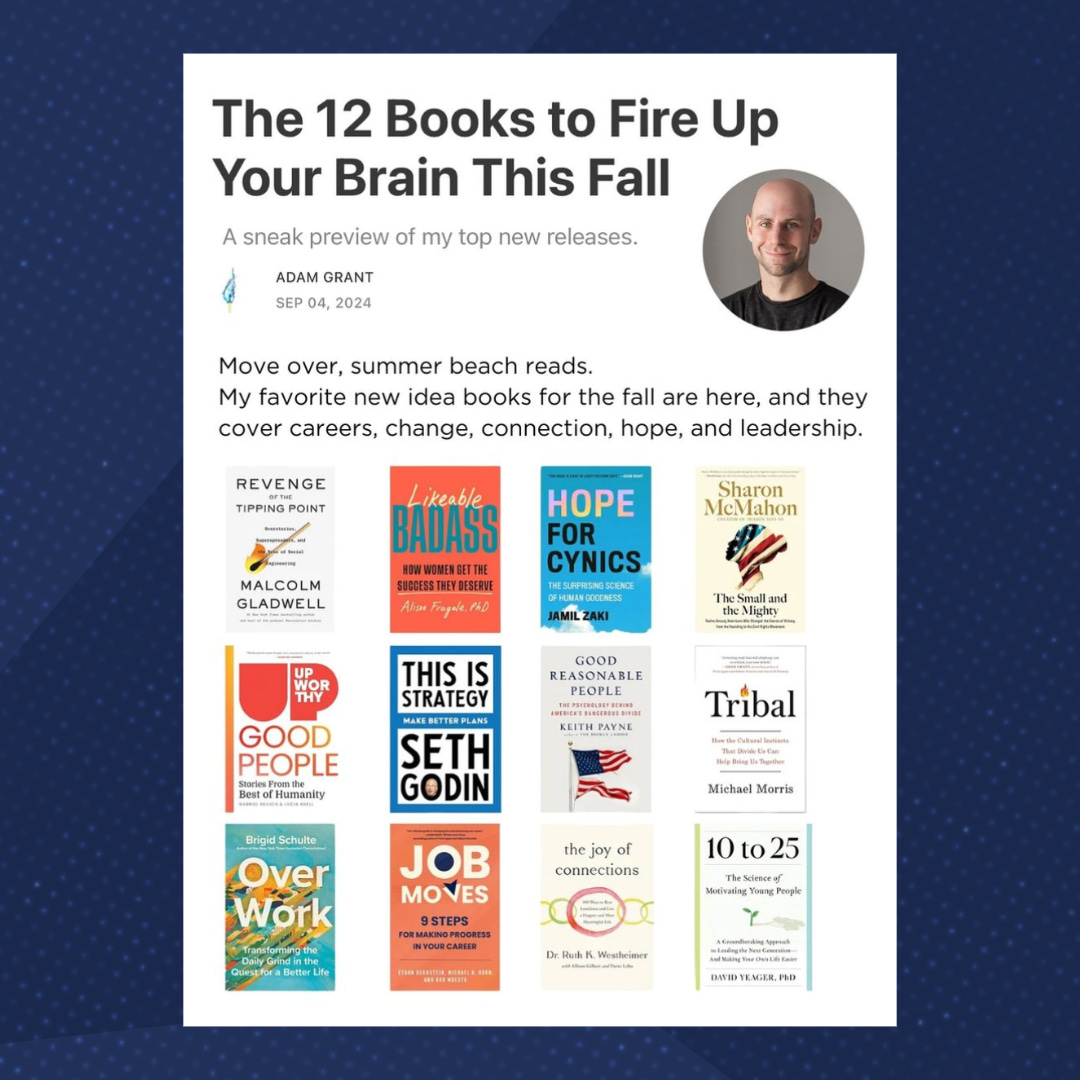Before I dive into an update about some new podcasts and articles worth checking out, I have some news I’m excited to share.
One of my favorite thinkers and writers,
(check out his Substack as well!), published a sneak preview of his list of 12 recommended books for the fall… and my next book, Job Moves: 9 Steps for Making Progress in Your Career, was on the list!My coauthors, Ethan Bernstein and Bob Moesta, and I are all ecstatic and thankful.
You can check out the whole post here, “The 12 Books to Fire Up Your Brain This Fall.” And this is what Adam wrote specifically about our book:
If you’re thinking about leaving your current role, this is the go-to resource for deciding when to leap and where to land.
And learn more about Job Moves, which publishes Nov. 19th by clicking below:
So Long Summer… Future U. Is Back
I’m turning this next update over to
, who leads production for the Future of Education and Future U.:School is back in session, and you know what that means: unpacking dorm rooms, browsing course catalogs, and kicking off another season of Future U.
While colleges—and the podcast—have been out for summer, the higher ed headlines have rolled on. In this episode, Michael and Jeff tackle the questions raised by the summer’s stories:
The Department of Education developed plans for its second year of the simplified FAFSA. Will it learn from the mistakes of its first rollout and avoid a repeat of the consequences it incurred?
We’re seeing more colleges opt for interim presidents during leadership changes, but do these holdover periods stall innovation?
Michael predicted in 2013 that 25% of colleges would close or consolidate within 15 years, and we’re tracking toward that. What can institutions do to survive and thrive as we move into the last year before the dreaded demographic cliff?
Two surveys on the public’s thoughts on higher ed were released recently. What do they tell us about how institutions need to change?
2U, the large online program management provider, declared bankruptcy this summer but then bounced back quickly. Can it ride this rebound to growth in an uncertain regulatory environment?
A new study shows a disconnect between high school grading and performance on more objective assessments. So, what are colleges to make of grades, and how can high schools better assess their students?
These are key developments setting the stage for the school year to come, so tune in here, at “So Long, Summer… We’re Back,” to get caught up. You can think of it as a fall orientation of sorts.
Three More Updates
Inside Higher Ed published a story on St. Joseph’s College, a Catholic institution in Indiana, which suspended operations seven years ago and lost its accreditation. Now St. Joseph’s is remaking itself as a “purveyor of workforce training programs.” My take in the article?
Accreditation isn’t necessarily the best or only imprimatur of quality. For example, [Horn] believes working to meet education quality outcomes standards developed by the organization Jobs for the Future could help an institution like Saint Joseph’s prove its worth. But abandoning the goal of accreditation does raise questions, Horn said. “How do they demonstrate that they are a better return on investment for short-term programs compared to what is a pretty crowded marketplace: community colleges, online programs, all sorts of things there,” he said. “Maybe they feel like their brand in the region will carry the day—I don’t know.”
While that might be a “reasonable bet,” Saint Joseph’s needs to find other ways to signal to prospective students, “This is a program that will get you to where you want to go,” he added. …
Some higher ed institutions are shifting their offerings and cutting liberal arts programs in response to growing skepticism about the returns of a college degree, a drop in high school students going straight to college and a demand for more direct routes to jobs, Horn said. But it’s rare to see an institution “doing such a fundamental rethink of mission” as Saint Joseph’s, though there have been a few other examples.
“It’s good to see some adaptability and moves toward where they think the future is going,” he said. “I don’t think Stanford and Harvard and Yale are going to make that pivot, nor should they, probably. But if you’re a rural, small college in the Midwest or Northeast, you have to think of a value proposition that really works.”
Read the full report here.
The New York Sun reviews Karin Klein’s new book, Rethinking College: A Guide to Thriving Without a Degree. They quoted some of our research in the article from my own book Choosing College:
For those who go to college because they don’t know what else to do or are pressured into it, 59 percent later say that college was a waste of money, a researcher at Harvard’s graduate school of education, Michael Horn, has found. University administrations are caught up in a costly “academic arms race,” Ms. Klein says, “to hire the biggest name in a particular field, without necessarily worrying about whether that’s going to mean a better education for the students.”
Check it all out here.
I joined the Higher Ed Geek podcast to offer institutions “Perspectives on Navigating the Turbulent Education Landscape.” It was a fun, 20-minute conversation, which you can listen to here.
As always, thanks for reading, writing, and listening.






